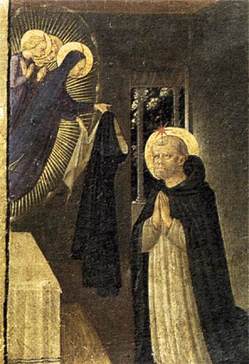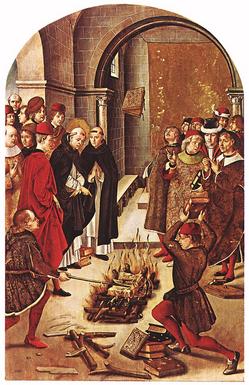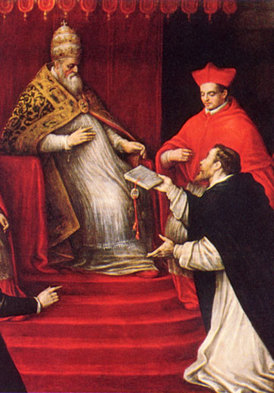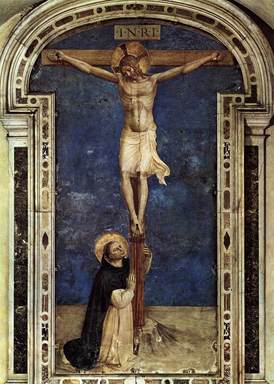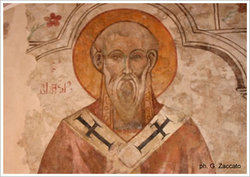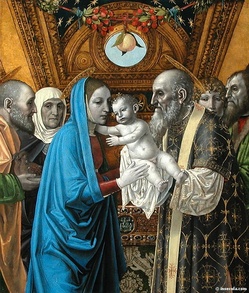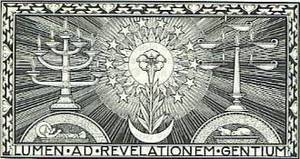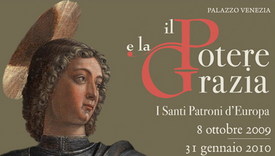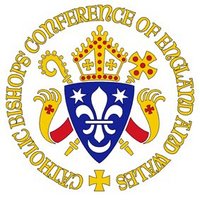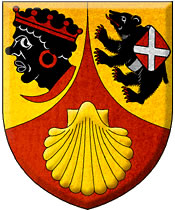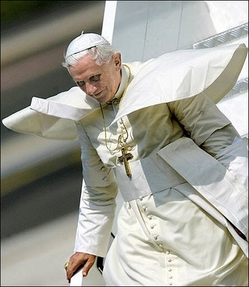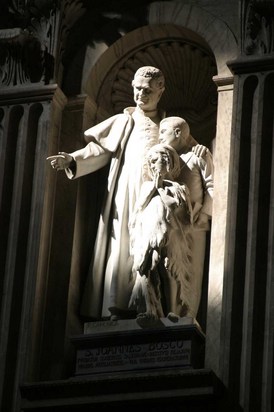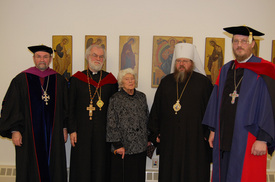I marveled at the Pope’s General Audience address on Saint Francis of Assisi last week. He’s given us more food to digest this week. Of course, I believe both of these addresses are the Pope’s corrective of the two great Orders of the Church. In many places both the Dominicans and the Franciscans have unhinged themselves from the living architecture of the Church and the Pope recognizes that we need these two charisms (and others, as well) to help the faith really thrive. I hope the Dominicans and Franciscans get the hint: if not, then we’re in trouble. Benedict XVI is telling us what’s in his heart and on his mind in these addresses, I hope the readers can read between the lines and do the hard work in reforming both groups of Friars.
Last week I
presented the luminous figure of Francis of Assisi; today I would like to speak
to you of another saint who, in the same period, made an essential contribution
to the renewal of the Church of his time. It is St. Dominic, the founder of the
Order of Preachers, known also as the Dominican Friars.
His successor in the
leadership of the order, Blessed Giordano di Saxony, gives a complete portrait
of St. Dominic in the text of a famous prayer: “Inflamed by zeal for God
and supernatural ardor, by your limitless charity and the fervor of a vehement
spirit, you consecrated yourself wholly with the vow of perpetual poverty to apostolic
observance and to evangelical preaching.” It is in fact this essential
feature of Dominic’s witness that is underlined: He always spoke with God and
about God. In the life of saints, love of the Lord and of neighbor, the seeking
of God’s glory and the salvation of souls always go together.
Dominic was born
in Spain, in Caleruega, around 1170. He belonged to a noble family of Old
Castille and, supported by an uncle priest, he was educated in a famous school
of Palencia. He was distinguished immediately for his interest in the study of
sacred Scripture and for his love of the poor, to the point of selling books,
which in his time constituted a good of great value, to help victims of famine
with what he collected.
Ordained a priest, he was elected canon of the chapter
of the cathedral in his native diocese, Osma. Although this appointment could
represent for him some motive of prestige in the Church and in society, he did
not interpret it as a personal privilege, or as the beginning of a brilliant ecclesiastical
career, but as a service to render with dedication and humility. Is not perhaps
the temptation to a career, to power, a temptation to which not even those who
have a role of leadership and governance in the Church are immune? I recalled
this a few months ago, during the consecration of some bishops: “We do not
seek power, prestige or esteem for ourselves. […] We know how in civil
society and often also in the Church things suffer because many people on whom
responsibility has been conferred work for themselves rather than for the
community” (Homily, Cappella Papale per l’Ordinazione episcopale di cinque
Ecc. mi Presuli, Sept. 12, 2009).
The bishop of Osma, who was named Diego, a
true and zealous pastor, very soon noticed the spiritual quality of Dominic,
and wished to make use of his collaboration. Together they went to Northern
Europe to carry out diplomatic missions entrusted to them by the king of
Castille.
While traveling, Dominic became aware of two great challenges for
the Church of his time: the existence of people who were not yet evangelized,
in the northern limits of the European continent, and the religious scourge
that weakened Christian life in southern France, where the action of some
heretical groups created disturbance and a falling away from the truth of the
faith. Missionary work on behalf of those who do not know the light of the
Gospel and the work of re-evangelization of the Christian community thus became
the apostolic goals that Dominic intended to pursue. It was the Pope, to whom
Bishop Diego and Dominic went to ask advice, who requested the latter to
dedicate himself to preaching to the Albigensians, a heretical group which held
a dualistic concept of reality, that is, of two equally powerful creative
principles, Good and Evil. This group, consequently, had contempt for matter as
coming from the principle of evil, even rejecting marriage, and reaching the
point of denying the incarnation of Christ, the sacraments in which the Lord
“touches” us through matter, and the resurrection of bodies. The
Albigensians esteemed a poor and austere life — in this sense they were even
exemplary — and they criticized the wealth of the clergy of that time.
Dominic
accepted this mission enthusiastically, which he carried out precisely with the
example of his poor and austere existence, with the preaching of the Gospel and
with public debates. He dedicated the rest of his life to this mission of
preaching the Good News. His sons would fulfill St. Dominic’s other dreams: the
mission ad gentes, that is, to those who did not yet know Jesus, and the
mission to those who lived in the city, especially in the universities, where
new intellectual tendencies were a challenge for the faith of the
well-educated.
This great saint reminds us that a missionary fire must always
burn in the heart of the Church, which drives incessantly to take the first
proclamation of the Gospel and, where necessary, to a new evangelization:
Christ is, in fact, the most precious good that men and women of all times and
all places have the right to know and to love! And it is consoling to see how
also in the Church of today there are so many — pastors and lay faithful,
members of old religious orders and of new ecclesial movements — that with joy
spend their life for this supreme ideal: to proclaim and witness the Gospel!
Other
men associated themselves to Dominic Guzmán, attracted by the same aspiration.
Thus, gradually, from the first foundation of Tolosa, was born the Order of
Preachers. Dominic, in fact, in full obedience to the directives of the Popes
of his time, Innocent III and Honorius III, adopted the ancient Rule of St.
Augustine, adapting it to the needs of apostolic life, which led him and his
companions to preach, moving from one post to another, but returning, later, to
their own monasteries, places of study, prayer and community life. In a
particular way, Dominic wished to highlight two values considered indispensable
for the success of the evangelizing mission: community life in poverty and
study.
First of all, Dominic and the Friars Preachers presented themselves as
mendicants, that is, without vast properties of land to administer. This
element rendered them more available for study and itinerant preaching and
constituted a concrete witness for the people. The internal government of the
Dominican monasteries and provinces was structured on the system of chapters,
which elected their own superiors, confirmed later by major superiors; hence,
an organization that stimulated fraternal life and the responsibility of all
the members of the community, exacting strong personal convictions. The choice
of this system stemmed precisely from the fact that the Dominicans, as preachers
of the truth of God, had to be consistent with what they proclaimed. Truth
studied and shared in charity with brothers is the most profound foundation of
joy. Blessed Giordano of Saxony said of St. Dominic: “He received every
man in the great bosom of charity and, because he loved everyone, everyone
loved him. He made a personal law for himself of being joyful with happy
persons and of weeping with those who wept” (Libellus de principiis
Ordinis Praedicatorum autore Iordano de Saxonia, ed. H.C. Scheeben, [Monumenta
Historica Sancti Patris Nostri Dominici, Romae, 1935]).
In the second place,
with a courageous gesture Dominic wished that his followers acquire a solid
theological formation, and he did not hesitate to send them to the universities
of the time, even though not a few ecclesiastics regarded with diffidence these
cultural institutions. The Constitutions of the Order of Preachers give great
importance to study as preparation for the apostolate. Dominic wanted his
friars to dedicate themselves to study, sparing no effort, with diligence and
compassion — to study founded on the soul of all theological learning, that
is, on sacred Scripture, and respectful of the questions posed by reason.
The
development of culture imposes on those who carry out the ministry of the Word,
at various levels, to be well prepared. Hence I exhort all, pastors and laity,
to cultivate this “cultural dimension” of faith, so that the beauty
of the Christian truth can be better understood and faith can be truly nourished,
reinforced and also defended. In this Year for Priests, I invite seminarians
and priests to appreciate the spiritual value of study. The quality of the
priestly ministry depends also on the generosity with which one applies oneself
to the study of revealed truths.
Dominic, who wished to found a religious Order
of Preachers-Theologians, reminds us that theology has a spiritual and pastoral
dimension, which enriches the spirit and life. Priests, consecrated persons and
also all the faithful can find a profound “interior joy” in
contemplating the beauty of the truth that comes from God, truth that is always
up-to-date and always living. Hence, the motto of the Friars Preachers —
contemplata aliis tradere — helps us to discover a pastoral yearning in the
contemplative study of such truth, by the need to communicate to others the
fruit of one’s contemplation.
When Dominic died in 1221 in Bologna, the city
that declared him its patron, his work had already had great success. The Order
of Preachers, with the support of the Holy See, had spread to many countries of
Europe to the benefit of the whole Church. Dominic was canonized in 1234, and
it is he himself, with his sanctity, who indicates to us two indispensable
means for apostolic action to be incisive. First of all, Marian devotion, which
he cultivated with tenderness and which he left as precious legacy to his
spiritual children, who in the history of the Church have had the great merit
of spreading the prayer of the holy rosary, so dear to the Christian people and
so rich in evangelical values, a true school of faith and piety. In the second
place, Dominic, who took care of some women’s convents in France and in Rome,
believed profoundly in the value of intercessory prayer for the success of
apostolic work. Only in Paradise will we understand how much the prayer of the
cloistered effectively supports apostolic action! To each one of them I direct
my grateful and affectionate thoughts.
Dear brothers and sisters, may Dominic
Guzmán’s life spur all of us to be fervent in prayer, courageous in living the
faith, profoundly in love with Jesus Christ. Through his intercession, we ask
God to enrich the Church always with genuine preachers of the Gospel.
